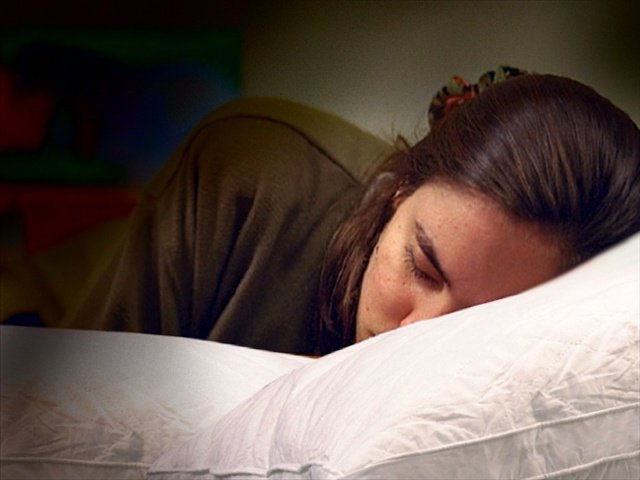How does your sleeping position affect your health, your dreams and your personality? We all have a favourite sleeping position – the position we snuggle up in at the end of a long day without even thinking about it. Which one is yours? I prefer to sleep on my stomach (bad, I know), but most of the time I lie on my right side because my French Bulldog snores.
The position we take to sleep has many effects on the body. Think about it: You sleep about a third of your life – that means that you spend a third of your time relatively motionless in one of a few sleeping positions.
These sleeping positions can affect how well and how much we sleep, and also affect our health. There are studies that suggest that the sleeping position also has an effect on our dreams – even a connection with our personality is mentioned.

The older we get, the more we tend to lie on our sides during sleep. Studies have shown that the preference for lying on one side begins in young adulthood and continues to increase over time. In particular, it has been shown that sleeping on the right side of the bed becomes more common in older adults. There is evidence that this preference for the right side in older adults protects heart function during sleep – but scientists are not sure that this explanation is true.
As we get older, we move less at night, change positions less often, and stay in one sleeping position longer before moving on to the next. Studies have shown that children change their sleeping position more than twice as often during sleep as adults over 65. Everyone who has a child sleeping in bed knows how much there is to it.
In general, sleep becomes more important with increasing age. Older adults are more likely to have health problems, including sleep problems. Older bodies are less flexible and more prone to stiffness and pain. At twenty, very few people think about their sleeping position. But from 40 or 50, the sleeping position can have a significant impact on how comfortable and deep you sleep.
WHAT GENDER HAS TO DO WITH THE SLEEPING POSITION
When it comes to sleep, men and women often have different preferences and needs. This also applies to the sleeping position. Research suggests that women prefer the embryonic position twice as often as men.
During pregnancy, the sleeping position is particularly important. Pregnant women are advised to avoid lying on their back and sleep on their side instead. According to the American Pregnancy Association, lying on the left side during pregnancy is particularly beneficial because it improves the supply of blood and oxygen to the placenta. Laying on your back can lead to back pain, difficulty breathing, heartburn, low blood pressure and circulatory problems in pregnant women.
As you will read in a moment, there are a lot of health factors that affect which sleeping position is the best for you.

SLEEPING POSITION, PERSONALITY AND DREAMS
Now comes a rather funny and interesting area of science. Not much research has been done on this yet, but some scientists and body language experts have investigated the relationship between sleeping position and personality: It is said that the sleeping position allows us to draw conclusions about our personality, our state of mind and our attitude to life.
The supine position indicates a high level of self-confidence. Back sleepers are allegedly stubborn and have high expectations of themselves and others. The arm position can also be relevant: Those who hold their arms close to their body during sleep are more reserved, while those who stretch out all their fours at night are more relaxed and open-minded.
The prone position is associated with defensiveness as well as perfectionism and inability to criticize. Scientists are of the opinion that abdominal sleepers tend to suffer from feeling overtaxed and not having sufficient control over their lives.
The lateral position (which, by the way, is very widespread) indicates a calm, open-minded and compromising personality.
Here there are additional factors that can have an additional effect on character, attitude to life and behaviour: Thus, additional conclusions can be drawn as to whether one sleeps on the right side (probably smoker, high caffeine requirement) or on the left side (creative, high level of education), whether one keeps the arms close to the body (trusting to gullible, possibly mentally inflexible) or rather sleeps with outstretched arms (high demands on oneself and others, possibly suspicious, also curious about the world).
SLEEPING IN THE EMBRYONIC POSITION
For whom is the embryonic position less suitable? Sleeping tightly rolled up can lead to stiffness the next morning. Breathing can also be impaired in this sleeping position because the diaphragm cannot work so effectively. If you prefer to sleep in the embryonic position, try a side sleeper pillow to prevent you from curling up too tightly.
According to the National Sleep Foundation, only 7 percent of sleepers choose this sleeping position. Even among my patients, abdominal sleepers are by far the smallest group. The bottom line is that the prone position is the worst of the possible sleeping positions, although there are exceptions: The prone position can also have a positive effect on snoring and sleep apnea. It may therefore be a good choice for people who do not suffer too much from these problems and simply cannot get used to sleeping on their side.
Embryonic posture
Research associates embryonic posture with sensitivity and anxiety and the desire for security. Those who curl up at night are probably conscientious and well organized and tend to think about everything for too long. At first, embryonic sleepers are shy and reserved, but behind their reserve lies a warm heart.
And what about the dreams? Studies suggest that the sleeping position also affects how and what we dream. If you are a side sleeper and often have bad dreams, you might want to lie on the other side.
On the right side you are less likely to have nightmares than on the left. Back sleepers are also more likely to dream badly – there are also studies that indicate that they are less able to remember their dreams.
Abdominal sleepers dream more vividly and intensively – and their dreams are more often about sex. At the same time, they are more likely to be unable or restricted to move in their dreams.

